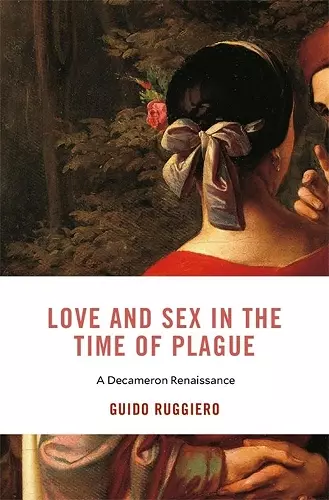Love and Sex in the Time of Plague
A Decameron Renaissance
Format:Hardback
Publisher:Harvard University Press
Published:25th Jun '21
Should be back in stock very soon

As a pandemic swept across fourteenth-century Europe, the Decameron offered the ill and grieving a symphony of life and love.
For Florentines, the world seemed to be coming to an end. In 1348 the first wave of the Black Death swept across the Italian city, reducing its population from more than 100,000 to less than 40,000. The disease would eventually kill at least half of the population of Europe. Amid the devastation, Giovanni Boccaccio’s Decameron was born. One of the masterpieces of world literature, the Decameron has captivated centuries of readers with its vivid tales of love, loyalty, betrayal, and sex. Despite the death that overwhelmed Florence, Boccaccio’s collection of novelle was, in Guido Ruggiero’s words, a “symphony of life.”
Love and Sex in the Time of Plague guides twenty-first-century readers back to Boccaccio’s world to recapture how his work sounded to fourteenth-century ears. Through insightful discussions of the Decameron’s cherished stories and deep portraits of Florentine culture, Ruggiero explores love and sexual relations in a society undergoing convulsive change. In the century before the plague arrived, Florence had become one of the richest and most powerful cities in Europe. With the medieval nobility in decline, a new polity was emerging, driven by Il Popolo—the people, fractious and enterprising. Boccaccio’s stories had a special resonance in this age of upheaval, as Florentines sought new notions of truth and virtue to meet both the despair and the possibility of the moment.
Paints a sweeping portrait of Florentine cultural life during the origins of the Renaissance…Shows how The Decameron illuminates the key social development through which Boccaccio (1313–1375) lived…Ruggiero expertly elaborates the theme of virtù in The Decameron, with results that are insightful and engaging. -- Andrew Stark * Wall Street Journal *
Ruggiero’s invitation, evident on every page of his well-researched volume, is to fully appreciate the historical and theological context that shaped these stories, and in turn how they prompted new ways of imagining the world. -- Dan Turello * Los Angeles Review of Books *
An insightful and provocative analysis of how love and sex were actually ‘lived’ in the Rinascimento. Ruggiero is not only a leading historian, but also a literary critic at the top of his game. His book is well-timed, eerily current in fact. Almost seven centuries after Boccaccio wrote of the horrors a pandemic inflicted on Florence, individual responses remain, in fact, fairly identical: fear of the neighbor, anxiety about the future, escape to the countryside, dread from physical touch, and searches for pleasant, escapist ways to fill the day. -- Valeria Finucci, author of The Prince’s Body: Vincenzo Gonzaga and Renaissance Medicine
A dazzling new contribution to the history of emotions. Desire, passion, love, sex and all their perils come to life in Ruggiero’s analysis of Boccaccio’s celebrated Decameron, giving us an imaginative reconstruction of the complex cultural world of courtship, honor, and marriage in fourteenth-century Tuscany. -- Joanne M. Ferraro, author of Venice: History of the Floating City
Guido Ruggiero, leading cultural historian of the Italian ‘Rinascimento’ and pioneer in the study of sexuality in the early modern period, now offers us an extraordinarily valuable reading of Boccaccio’s Decameron. From his rich and innovative perspective, the ‘hundred novelle’ unfold in the shadow of the devastating Black Plague of 1348 and in a longer-term transition in Florence from medieval feudalism to economically-driven republicanism. Students and scholars of Boccaccio’s masterwork may or may not finally agree with all of Ruggiero’s bold conclusions, but anyone who comes to grips with them will be the wiser for it. -- Albert Russell Ascoli, author of A Local Habitation and a Name: Imagining Histories in the Italian Renaissance
Quite fascinating for its reading of the Decameron, but beyond that also offers considerable insight into the place and times—and tells a good story of both the beginnings of the Renaissance and attitudes towards love and sex. An enjoyable and interesting read. * Complete Review *
Ruggiero, in this exemplar of microstoria, demonstrates the prominent place in the history of modern notions of love, sex, marriage, and power of the Italian Renaissance. -- Dean T. Ferguson * International Social Science Review *
This energetic book offers a historian’s take on the Decameron, exploring its mold-breaking character. -- Cormac Ó Cuilleanáin * Speculum *
Ruggiero provides scholars and students with a concrete study of how the stories of the Decameron might have been understood at the time they were written. In so doing he has created an extremely helpful framework within which to compare how modern readers and medieval readers processed not only sex and love…but also violence, deception, trauma, and grief. -- Mary Watt * Renaissance and Reformation *
Timely…Ruggiero’s imaginative retelling of Decameron novelle makes Boccaccio’s masterwork newly accessible to modern audiences and Ruggiero’s monograph a great pedagogical addition to the Renaissance history classroom as well as a welcome addition to the field. -- Katherine McKenna * Medieval History Journal *
A successful attempt to contextualize and therefore to interpret properly what Boccaccio intended his Decameron to convey to its then-contemporary audience…Highly recommended. -- William Landon * Journal of Modern History *
ISBN: 9780674257825
Dimensions: unknown
Weight: unknown
320 pages